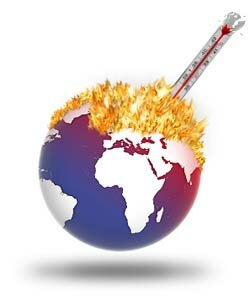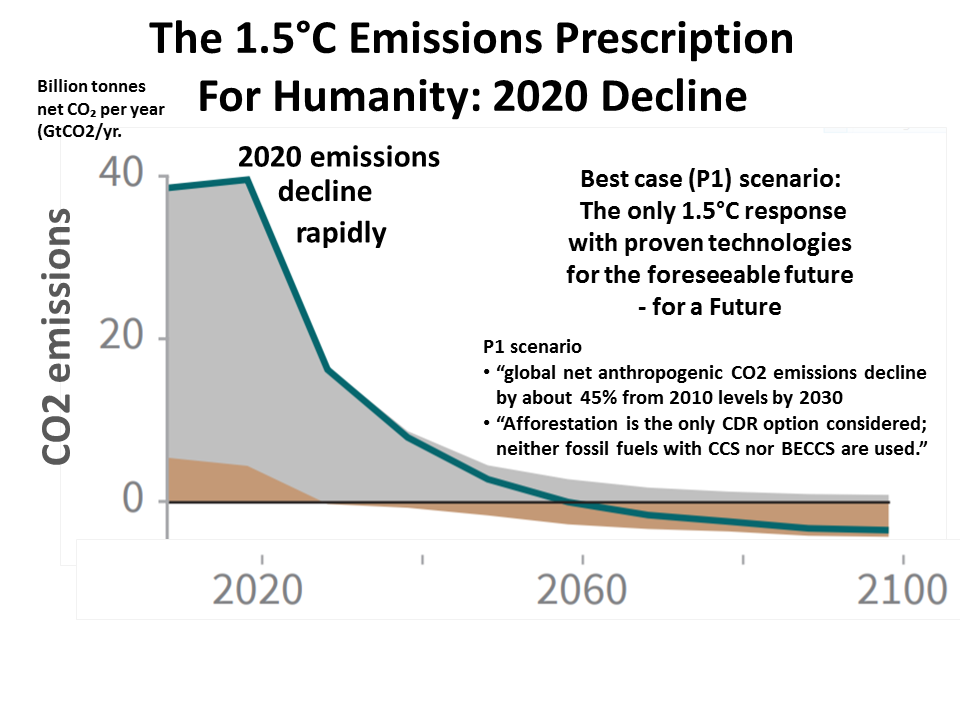GLOBAL CLIMATE CHANGE EMERGENCY DECLARATION
The British Medical Journal (1 Oct 2014)
urged the World Health Organization (WHO) to
"now declare a public health emergency"
This is the opportunity for all health professionals to write in support of the BMJ to the WHO and to their governments, urging them to declare the climate change emergency.

The simplest most important thing is to tell governments that they have to stop subsidizing fossil fuels and charge polluters the full cost of pollution
Health care professionals and their associations can urge governments to recognize that today's evidence shows the world is far beyond dangerous interference with the climate system, and we are in a state of environmental and public health planetary emergency.
They can urge that governments propose an atmospheric CO2 limit of 350 ppm in compliance with the 1992 UN climate convention.
(James Hansen, Target CO2)
They can urge an emergency zero-carbon response for the rapid transition to a clean, zero-carbon, everlasting energy future — the only viable and sustainable future that humanity has.

What follows is a declaration:
- for these climate change concerned health care organizations to adopt;
- to be sent to all levels of government;
- to send to the UNFCCC Secretariat.
It is helpfull to use the language of the 1992 UN climate convention, by saying, for example:
"We respectfully urge ... to pass a resolution/position statement that the world is beyond dangerous climate interference, in a committed global climate change state of planetary emergency."
Dr. John Holdren, Science Advisor to President Barack Obama, said in a 2006 science lecture, Meeting the Climate Change Challenge that the world is far beyond atmospheric greenhouse gas concentrations that constitute dangerous anthropogenic interference with the climate system, and presents a real and rising risk of global climate catastrophe.
Professor James Hansen, in 2008 and 2012 public statements, said that already observed impacts of global warming (especially in the Arctic and damaging extreme weather events worldwide), at today's 0.8ºC warming, together with a much greater committed (locked-in) warming due to climate system inertia, constitute a planetary emergency for billions of people, all future generations of humanity, and all species.
- leading health authorities have stated that climate change (already affecting human health around the world) is the health challenge of the 21st century, and that unless decisive action is taken now, the world will face "global public health and environmental catastrophe" (UK Faculty of Public Health, American Public Health Association, British Medical Association);
- due to climate system inertia, we are committed (locked in) to a warming that is much higher than today's;
- the United Nations Environment Program 2007 Global Environmental Outlook (GEO-4) warned that major ongoing global environmental issues plus climate change will "affect the survival and human well-being of both present and future generations";
- deaths (hundreds of thousands per year) and disasters due to global climate change are already impacting the most vulnerable regional populations (especially children), who are also the most socio-economically deprived and least able to adapt (Global Humanitarian Forum, IPCC, Red Cross/Red Crescent, UN Office for the Coordination of Humanitarian Affairs);
- research published by leading climate scientists shows that Arctic summer sea ice is rapidly disappearing and Arctic methane is emitting; both feedbacks put the Earth in peril and threaten to unleash a planetary cataclysm;
- increases in atmospheric CO2 levels are accelerating and methane is now increasing due to carbon feedbacks;
- corals and other marine life will not survive the rapid warming and acidification of the ocean (there is already a 40 percent drop in phytoplankton populations);
- CO2 emissions have been tracking the worst-case IPCC scenario;
- climate change is now happening far more rapidly than the IPCC models indicated (see CCEMR State of the Climate);
- recently published research shows that it is now practically too late to prevent a global warming of over 2ºC and that the level of warming will last over 1,000 years;
- global greenhouse gas emissions must be slowed, stopped and reversed by 2020 at the very latest to avoid irreversible climate catastrophe (IPCC 5th Assessment 2014,) ...
*******************
I/We (healthcare and other organizations)
- Urge your government to terminate fossil fuel subsidies and charge central polluters the full cost of pollution- in short order'
- declare that we are beyond "dangerous interference with the climate system" (UNFCCC Objective) in terms of population health and mortality, and food and water security; and
- declare a state of global climate change emergency on behalf of today's climate-change-vulnerable populations, the generation of today's children, and all future generations, calling for an emergency-scale international response.
- emissions must decline within the next couple years- no later than 2020 (IPCC 2014 5th assessment RCP2.6)
I/We call on our municipal councils and regional governments
- to declare that we are beyond "dangerous interference with the climate system" (UNFCCC Objective) in terms of population health and mortality, and food and water security of huge vulnerable populations, all regions, and all future generations; and
- to declare a state of global climate change emergency on behalf of today's climate-change-vulnerable populations, the generation of today's children, and all future generations, demanding an immediate and urgent emergency-scale international response.
I/We call on our national governments
- to agree on and implement the IPCC AR5 best case emissions scenario RCP2.6, which is the only way to possibly limit global warming to 2C (and 1.5C). We call for an emergency transition to a clean, zero-carbon, everlasting energy future — the only future humanity has.
Specifically, I/we call for immediate action
- to stop all the enormous subsidies going to the fossil fuel industries ($1.9 trillion per year, according to the International Monetary Fund in 2013)
- to switch the direct subsidies to clean, zero-carbon energy industries
- and to put a price on the externalized costs of carbon pollution.
See Sustaining a Healthy Future: Taking Action on Climate Change by the Faculty of Public Health, Royal Colleges of Physicians of the United Kingdom

Return from Global Climate Change Emergency Declaration to
Emergency Action
The 2016 Planetary Health Alliance (2019 VIDEO)
Video Dr. H. Montgomery's 2018 lecture says it all

Lancet Countdown (Nov)2018 Report for policy makers
2017 WHO 5th Climate & Health Summit
2014 Lancet From Public to Planetary Health:
A Manifesto
2014 BMJ Climate Change & Human Survival
2014 BMJ Climate Change
is a Health Emergency
IPCC 5th Assessment
Climate & Health Council




